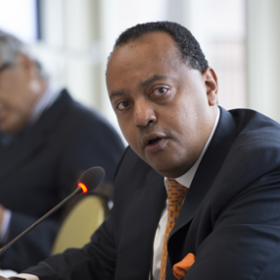
East Africa's "Emerging Resource Bonanza"
On January 31st, a panel session hosted by the EastWest Institute and Gallup in Washington, DC assessed the many challenges and opportunities presented by recent discoveries of oil and gas deposits in East Africa. According to the panel members, it is becoming evident that this region will soon be the site of an energy boom. Chinese companies are already playing a major role, and companies like ExxonMobil, Shell, and Statoil have arrived to explore an area encompassing parts of Ethiopia, the southern tip of Madagascar, and much of the territory in between.
EWI Board Member Tewodros Ashenafi—Chairman and CEO of Southwest Energy, the first Ethiopian oil and gas exploration company—maintained that the “emerging resource bonanza” will transform the region dramatically. "The gas that is being discovered in Mozambique is really awe-inspiring,” he declared. “It has the opportunity to be the next Qatar."
In addition to the potential dividends for corporations and governments, Ashenafi pointed out that the regional cooperation needed to fully make use of oil fields and gas deposits would provide an opportunity for a “prosper-thy-neighbor instead of beggar-thy-neighbor approach.”
But the region still faces major challenges, which could impede development. Raymond Gilpin, director of the United States Institute of Peace’s Center for Sustainable Economies, cautioned that some projections about the time required to get new projects going may be too optimistic due to security and political obstacles. Many of the deposits “just happen to be in contested areas,” he noted. “You only prosper thy neighbor if you work with your neighbor.”
Unresolved territorial disputes have often stalled oil production in East Africa. For example, the oil fields in newly-established South Sudan were a major point of contention following its secession from Sudan in 2011.
An additional obstacle: many resource-rich countries in the region lack basic infrastructure, like pipelines and refineries for oil production. Cross-border collaboration could reduce costs for all stakeholders. The construction of secure pipelines would allow landlocked oil-producing countries like Uganda, for example, to export oil to Indian Ocean ports via Kenya.
Gilpin agreed that recent and future energy discoveries in the region could provide a “fiscal boon for African countries.” However, he also spoke of the “need to manage expectations.” The potential was significant, he continued, “but not like Saudi Arabia.”
Jon Clifton, a partner at Gallup Government Group, presented data on East African countries taken from the Gallup World Poll, a survey of local opinion on a number of issues, including corruption , well-being and how safe average citizens feel walking the streets. He also stressed the need to manage expectations, pointing out that public sentiment needs to be carefully monitored along with traditional metrics like GDP. A nation’s rising GDP, Clifton noted, “doesn’t mean that their well-being will rise in tandem.”
Abdeta Beyene, the former director general of African Affairs at the Ethiopian Ministry of Foreign Affairs, concurred that “East Africa is a resource-rich opportunity.” One of the most important facts to consider in looking at the potential of these discoveries, he noted, is that “the Horn of Africa is changing in terms of security.” Security remains a serious concern, but the panelists agreed that recent more positive trends are still often not recognized by outsiders. While Chinese companies haven’t hesitated to rush into the region to exploit the new opportunities, many Western companies are still vacillating.
Providing security concerns are addressed, oil and gas revenue could enable governments to develop domestic infrastructure—roads, schools, hospitals, sewage systems—promoting sustainable employment in rural areas and improving access to quality healthcare.
In order for these resources to be utilized in a beneficial manner, the panelists argued that there is an urgent need to develop the appropriate training and infrastructure, effective private-public partnerships, and for governments to adhere to existing international standards.
Ashenafi rejected that notion that a so-called “resource curse” may threaten East Africa. “I don’t think oil is a curse,” he said. “It’s like a knife: it depends what you do with it. It’s how these resources are organized.”

